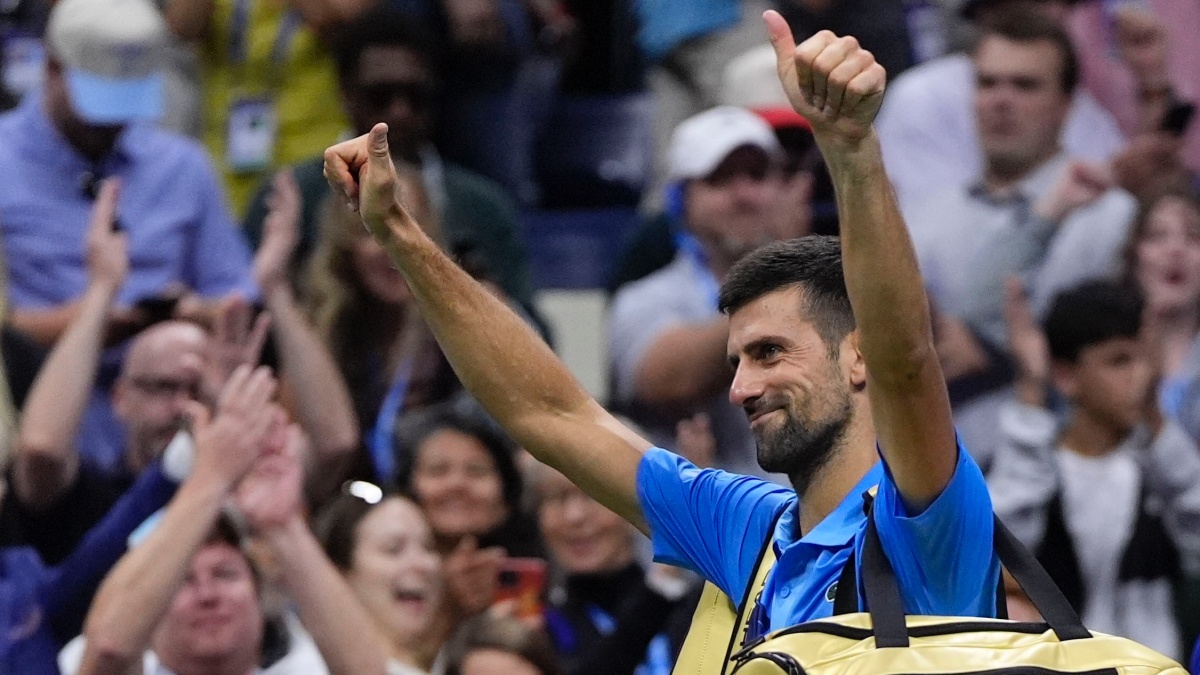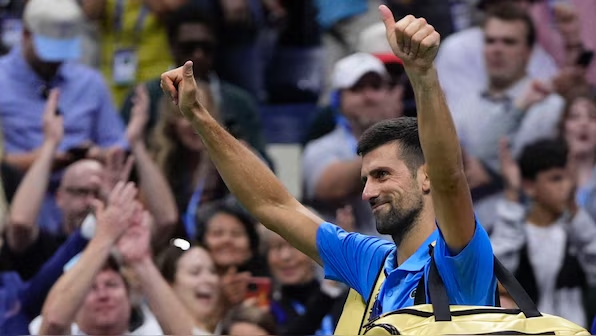)
Novak Djokovic tried to put on a brave face after his surprise third-round defeat at the US Open. As he walked off the Arthur Ashe Stadium, he raised his arms, put two thumbs up, and grinned at the crowd before heading towards the locker room.
A 4-6, 4-6, 6-2, 4-6 loss to Australia’s Alexei Popyrin, which ended shortly before midnight on Friday, closed the Grand Slam season for the Serb, marking it the first year since 2017 that he didn’t win at least one Grand Slam title.
Djokovic admitted later, like Carlos Alcaraz, he was running on low fuel at the US Open. Both Djokovic and Alcaraz reached the Paris Olympics final where the Serb won his maiden Olympic gold medal.
The Serb added the only piece missing in his packed trophy case with the Olympic title weeks ago in what he described as the biggest achievement of his career.
But from that highest of highs came a crushing low in New York as the World No. 2 suffered his earliest exit from the year’s final major since 2006.
“I spent a lot of energy winning the gold and I did arrive to New York just not feeling fresh,” he said. “I didn’t have any physical issues. I just felt out of gas, you know, and you could see that with the way I played.”
There were early signs of a wobble. When he began his campaign for a record 25th major title, he beat qualifier Radu Albot in the first round, while striking nearly twice as many unforced errors as winners.
He struggled in the sweltering conditions during the second round before Laslo Djere gave him his 90th win at the US Open, retiring midway through the third set.
“From the first match, I just didn’t find myself at all on this court. It’s all I can say,” Djokovic told reporters.
But the drop in intensity and level was most evident against Popyrin. He produced an astonishing career-high 14 double faults and 49 unforced errors.
“I tried so many things, and sometimes that’s an issue, you know, is that you move away from the basics that work. Then you just lose the basics. You lose the foundation,” he said.
“It was just really a big struggle mentally for me to play these three matches here, because I wasn’t playing even close to my best.”
What does Djokovic’s latest Grand Slam loss mean?
For someone who has won 24 major titles, more than any other man in tennis history, maybe that’s not such a big deal.
But the 37-year-old has also been clear that he’s someone who aspires to accumulate as many of those trophies as possible.
“It’s hard to see the big perspective right now. You’re just angry and upset that you lost and the way you played, and that’s it,” said the defending champion Djokovic.
“But tomorrow is a new day,” he continued, “and I will obviously think about what to do next.”
Is this the end of the Big Three (again)?
This has been speculated, guessed and predicted time and again. Every time a Jannik Sinner, an Alexander Zverev or a Carlos Alcaraz would get the better of Djokovic or win big titles, the inevitable end of Big Three (Djokovic, Rafael Nadal and Roger Federer) would be a talking point.
But, for once, it won’t be an outlandish claim. 2024 will go down as the first season since 2002 – 22 years ago – without a Slam title for any member of the Big Three.
Federer, now retired, won his first major at Wimbledon in 2003, beginning a run of magnificence for the trio. Their combined total is 66 Slams.
No man had collected more than Pete Sampras’ 14 at the sport’s four most important events until Federer ended up with 20. Nadal then raised the bar to 22. And then Djokovic surpassed him.
“They brought it to a whole different level,” Casper Ruud said when Federer retired in 2022, “and showed that anything is possible.”
But with Federer, 43, out of the game, and Nadal, 38, on the precipes of retirement after a series of injuries, including hip surgery a little more than a year ago, now the real question becomes where things stand for Djokovic.
Age seems to have caught up with Djokovic as well. He lost in the semifinals of the Australian Open, withdrew before the quarterfinals of the French Open because he needed an operation on his right knee and was beaten by Carlos Alcaraz in the final of Wimbledon.
Paris Olympics gold medal re-ignited the spark that Djokovic is not quite done yet. But it came in three sets and the majors are played over best-of-five-sets. Except, in his loss to Popyrin, the length of the match didn’t seem to matter. In the years gone by, Djokovic has won from seemingly unwinnable positions and grunted his way past the finish line even under duress.
That wasn’t the case this time around.
The unusual surface-switching this season, from the French Open’s clay to Wimbledon’s grass to the Summer Games’ clay to the US Open’s hard courts, hasn’t made things easier – for him or the others.
It’s the first time since 2000 — and only the second time in the Open era, which began in 1968 — that two of the top three men’s seeds were bundled out during Week 1 in New York. As things enter the second week, just one previous men’s champion remains alive in the bracket, 2021 winner Daniil Medvedev.
